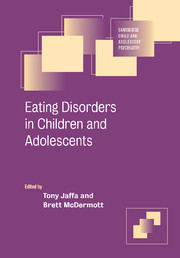
-
Select format
-
- Publisher:
- Cambridge University Press
- Publication date:
- December 2009
- December 2006
- ISBN:
- 9780511543890
- 9780521613125
- Dimensions:
- Weight & Pages:
- Dimensions:
- (247 x 174 mm)
- Weight & Pages:
- 0.674kg, 336 Pages
You may already have access via personal or institutional login
Book description
Anorexia Nervosa and other eating disorders are arguably the most complex mental health problems that a child or adolescent may experience. Numbers seeking help are on the increase, and the complexity of these disorders challenges even the most experienced clinician. In this 2006 book, the experience of numerous practitioners with international reputations in the field is brought to bear on the broad range of issues a good clinician needs to know about, from the history of the disorder through to treatment, psychopharmacology, the psychotherapies, epidemiology, comorbidities, eating disorders in boys, and neuroimaging. The book is divided into parts detailing the scientific underpinnings, abnormal states, the evidence base for treatments, and finally public health issues, including service delivery models and perspectives on prognosis and outcomes. Clinicians encountering eating disorders will find this latest addition to the Cambridge Child and Adolescent Psychiatry series invaluable.
Reviews
'The book is pleasingly presented and … The introduction consists of a truly fascinating historical and developmental review, … The section on evidence-based care has useful reviews of acute and chronic medical complications, individual and family psychotherapies, … there is much of interest and value for those who wish to gain an overview of current knowledge of the many problems in this population, without having to delve into a voluminous text.'
Source: British Journal of Psychiatry
Contents
Metrics
Full text views
Full text views help Loading metrics...
Loading metrics...
* Views captured on Cambridge Core between #date#. This data will be updated every 24 hours.
Usage data cannot currently be displayed.
Accessibility standard: Unknown
Why this information is here
This section outlines the accessibility features of this content - including support for screen readers, full keyboard navigation and high-contrast display options. This may not be relevant for you.
Accessibility Information
Accessibility compliance for the PDF of this book is currently unknown and may be updated in the future.


